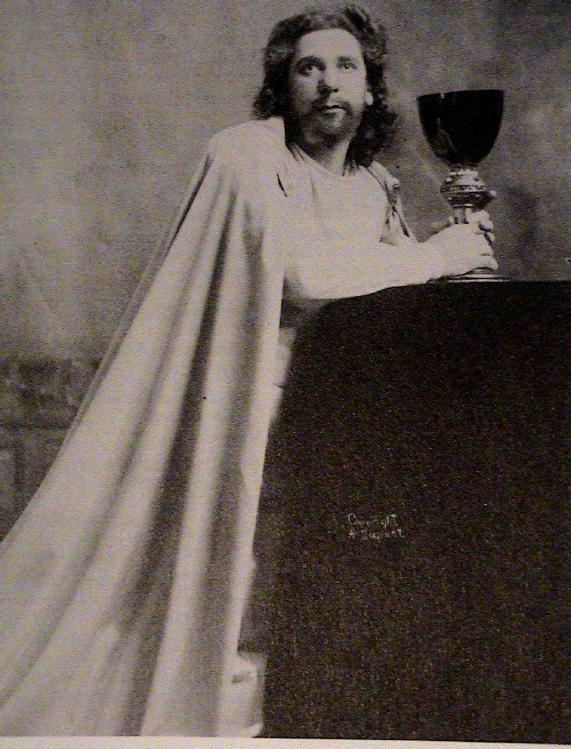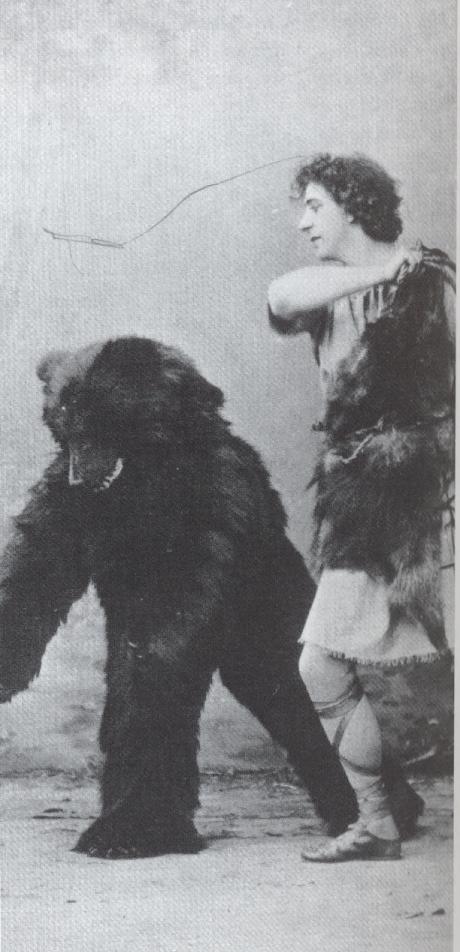Alois Burgstaller
27 September 1871 Holzkirchen (Oberbayern) – 19 April 1945 Gmund am Tegernsee
Parsifal
with the bear in Siegfried
Alois Burgstaller was born on September 27th, 1871 in Holzkirchen, made his debut in 1894 in
Bayreuth, where he sang up to 1902. His best parts were Siegfried,
Siegmund, Parsifal, and Erik. The singer went on tour through Amsterdam, London,
Brussels, and Paris. 1903–1909, Burgstaller sang at the Met (debut in
Walküre). Later he was a voice teacher in
Munich; he died on April 19th, 1945. He recorded a few
Edison cylinders and can also be heard on Mapleson cylinders.
Reference: Einhard Luther Helden an geweihtem Ort. Biographie eines
Stimmfaches, Teil 2: Wagnertenöre in Bayreuth (1894–1914), Trossingen – Berlin 2002
He learned clockmaking, before his voice was discovered by Hermann Levi and Cosima Wagner. He then studied with Eduard Bellwidt
in Frankfurt, and primarily with Julius Kniese in Bayreuth proper.
1894, he made his debut at the Bayreuth Festival as Heinrich der Schreiber in Tannhäuser und als First Grail Knight in
Parsifal. 1896–1902, he sang Froh in Rheingold in Bayreuth, 1896/97 and 1908 Siegmund, 1899–1902 and 1909
Siegfried, 1899 and 1902 Parsifal, 1901 Erik.
Siegfried had been his first large Wagner role at the Nürnberg theater in 1894. He was soon considered one of the big
Wagner tenors of his generation. He never was a member of the troupe of any German theater (with the sole exception of Frankfurt
in 1901/02), but was a regular guest at the leading German opera houses: 1897 at the Berlin Court Opera, 1903–10 at the
Munich Court Opera, 1897–1901 in Frankfurt, further in Hamburg, Bremen and Leipzig.
1897 and 1899 guest appearances in Amsterdam, 1900 in Zürich (as Siegfried), 1906 at Covent Garden as Erik and Tristan,
1906 and 1907 in Paris in Wagner concerts; he also sang in Brussels.
1903–09, he was a member of the Metropolitan Opera New York, making his debut as Siegmund. Er sang twelve parts there, all
Wagner: Lohengrin, Loge, Tristan, Tannhäuser, Erik, Stolzing, Siegmund (25 times), Siegfried. He also sang in New York,
in spite of an explicit interdiction from Bayreuth, the first American Parsifal on 24 December 1903, and sang the role for a total
40 times at the Met. Therefore, he was banished from the Bayreuth Festival, until they reconciled in 1908, and he returned as
Siegfried, and the following year as Siegmund.
He voice was prematurely worn by the constant overstraint of singing heavy Wagner roles. He was later a teacher in Munich.
Reference: Kutsch & Riemens
Burgstaller's voice was certainly a wreck when he made his few recordings, but he is definitely worth
listening for one reason: his German diction (both speaking and singing) is probably the most beautiful of all singers on record.
I wish to thank Vladimir Efimenko for the picture (Parsifal), recording and biographical notes.
Discography
Mapleson cylinders, New York 1904
Meistersinger von Nürnberg (Wagner): Huldreichster Tag (Prize Song excerpt)
(uncertain whether it's Burgstaller on 17 January or Dippel on 6 March)
Columbia cylinders, New York 1906?
Lohengrin (Wagner): In fernem Land 85077
Edison 2-min cylinders, New York 1906?
Don Giovanni (Mozart): Bande der Freundschaft B25
Der Freischütz (Weber): Durch die Wälder B31, rr: IRCC136
Der fliegende Holländer (Wagner): Mein Herz, voll Treue B45
|

